As a theatre company stages an English translation of Vijay Tendulkar's controversial classic, Mitrachi Goshta, industry watchers discuss the relevance of the icon's work across decades and languages
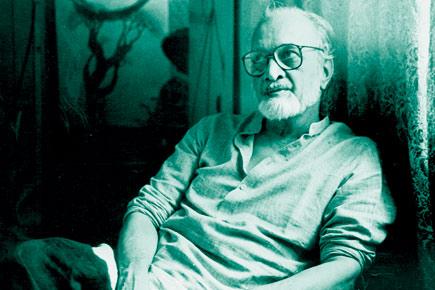
Vijay Tendulkar
![]() Written in 1981, late playwright Vijay Tendulkar's play Mitrachi Goshta told the story of a love triangle between three students in a Pune college. Bapu, Mitra, Nama's story is, however, not the regular triangle. When Bapu's wish of getting to know Mitra comes true, he becomes party to her inner struggles with her sexuality, and eventually gets drawn into a game of vacillating sexual politics between she and Nama, the girl she desires. At a time when homosexuality was taboo, Tendulkar's work raised many eyebrows. This weekend, Akash Khurana's Akavarious will perform the English version of the play, titled A Friend's Story. "It is one of his least performed plays, even in Marathi, which is why we chose to do it," says Khurana. "We chose the English version, translated by Gowri Ramnarayan. Our cast is young, and our lead actors are Maharashtrian. We have retained the script. I admire his writings that have a sensitivity and a structured graph." The original Marathi play featured stalwarts like Vinay Apte and Rohini Hattangadi
Written in 1981, late playwright Vijay Tendulkar's play Mitrachi Goshta told the story of a love triangle between three students in a Pune college. Bapu, Mitra, Nama's story is, however, not the regular triangle. When Bapu's wish of getting to know Mitra comes true, he becomes party to her inner struggles with her sexuality, and eventually gets drawn into a game of vacillating sexual politics between she and Nama, the girl she desires. At a time when homosexuality was taboo, Tendulkar's work raised many eyebrows. This weekend, Akash Khurana's Akavarious will perform the English version of the play, titled A Friend's Story. "It is one of his least performed plays, even in Marathi, which is why we chose to do it," says Khurana. "We chose the English version, translated by Gowri Ramnarayan. Our cast is young, and our lead actors are Maharashtrian. We have retained the script. I admire his writings that have a sensitivity and a structured graph." The original Marathi play featured stalwarts like Vinay Apte and Rohini Hattangadi
ADVERTISEMENT
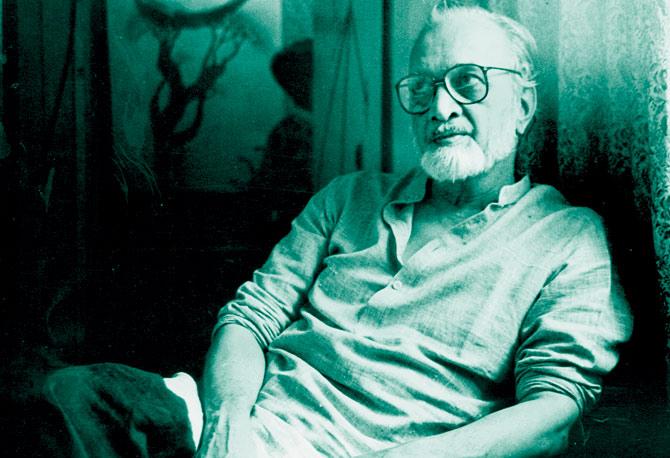
Vijay Tendulkar
Tendulkar for today
Last night, theatre group Ank performed Jaat Hi Pucho Sadhu Ki that deals with casteism. "Many of Tendulkar's plays were translated into Hindi by Dr Vasant Dev. Sometimes, the setting of the play was changed to UP, Bihar or MP to suit the use of Hindi. The caste system that he talks about is as rampant in North India, where even today, discrimination, honour killings and hate crimes exist. The Hindi version did better than it did in Marathi," recalls Preeta Mathur Thakur of Ankh. "His plays tackled complex subjects with humour. He talked of how even after empowerment if each caste, including Dalits, formed their cliques, it wouldn't help. Most of his plays, even the funny ones, had a hard-hitting end, sometimes, with a cathartic speech. So even if the audience took offence, it was too late as the play was over," adds Thakur. Tendulkar didn't mind changes made to his stories. "I talked to Tendulkar on several occasions when he came to watch the multi-hued productions revisiting his classics. I remember a particular instance when Dinesh Thakur presented a slightly different version of Kamla and Jaat hi Poocho Sadhi ki.. in a festival of Tendulkar's plays in 2000, the playwright did not seem to mind at all. He just smiled and said theatre is a director's playground," shares culture writer and mid-day columnist, Sumedha Raikar-Mhatre. She recalls him being a malleable playwright who enjoyed script reincarnations. "
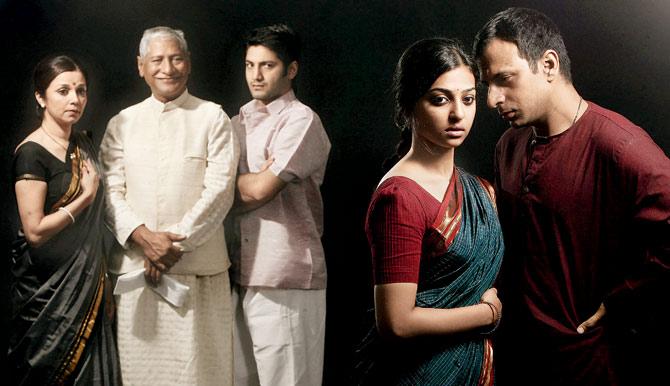
A scene from Prime Time Theatre Co's Kanyadaan
Staging a cause
Tendulkar's other works included pre-marital sex and childbirth (Shrimanta, 1956), prostitution (Kamala, 1981), and the exploitative nature of political power (Ghashiram Kotwal, 1976). "He wrote with a lot of intensity. His enquiry of corruption amounts to the upper crust of the 1990s. Thank god, he dealt with it the way he did. I miss him. I don't know how he would react to what is happening today," shares novelist, playwright and critic Kiran Nagarkar. Many of Tendulkar's plays also highlighted issues faced by women like his play Anji that looks at rape and the discrimination a girl faces in society. Pritesh Sodha was just 24 when he acted in Baby (2006) about a woman who gets exploited by people in many ways. "I have read all Tendulkar's plays. When I did Baby at Thespo, I wanted to change the world," shares Sodha. "I have also performed The 5th Woman, one of his last works. He wrote this in English," he reminisces.
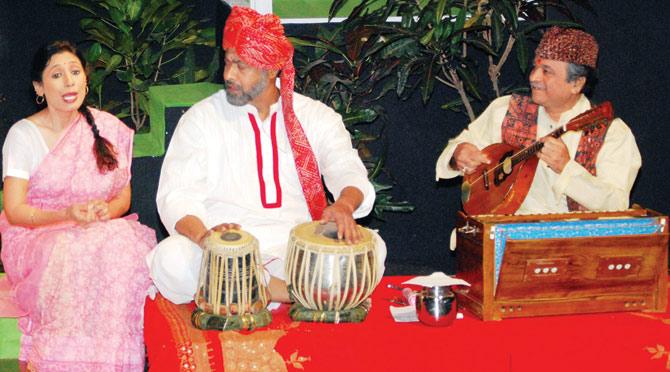
A scene from Anji by Ank
Young and the clueless?
Actor-director Lilette Dubey finds it annoying that the younger generation hasn't heard of writers like Tendulkar. When we were performing an English version of Kanyadan, six years ago, a few young boys asked me if Vijay Tendulkar was related to Sachin. This was appalling," shares Dubey. "In India we still remake classics of the West. Who will revive the classics written by our writers? Kanyadaan talks about multiple issues including caste. Tendulkar was a world-class writer. His scripts were not linear and narrow. Radhika Apte who played the lead in the play read the script in Marathi and helped us nuance our performance in English. He wrote fearlessly. More younger English and Hindi-speaking audience need to watch his plays," she suggests.
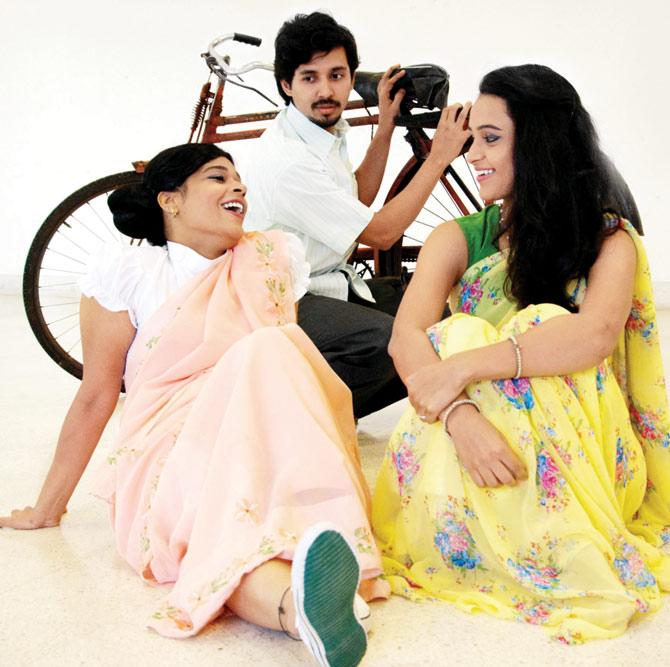
A scene from Akavarious' A Friend's Story. Pic Courtesy/ Narendra Dangiya
Nagarkar puts his work into perspective, "Tendulkar was involved with the idea of violence in India." He also wrote screenplays for movies like Nishant (1974), Akrosh (The Cry) (1980), and Ardha Satya (The Half-Truth) (1984), which established him as an important chronicler of violence of the present. Actor Naseeruddin Shah sums up his legacy, "The first experimental film-maker in Hindi was KA Abbas in the 1950s. Post that came Tendulkar. People like him paved the way for the future. If not for writers like him and film makers like Shyam Benegal and Mrinal Sen there wouldn't have been so many youngsters making relevant films today. They showed the way.
 Subscribe today by clicking the link and stay updated with the latest news!" Click here!
Subscribe today by clicking the link and stay updated with the latest news!" Click here!






